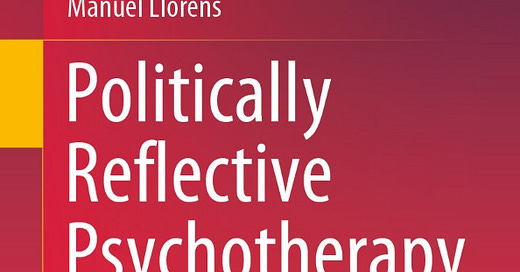Book review: Politically Reflective Psychotherapy: Towards a Contextualized Approach
A call to action for clinicians to be politically aware in order to protect their field and those that seek their help
Our esteemed colleague, Professor Dr. Manuel Llorens, is a distinguished psychologist, accomplished psychotherapist, dedicated researcher, and passionate social activist from Venezuela. His significant contributions to the field of psychotherapy have focused on understanding the interplay between political and societal influences on mental health.
Professor Llorens has co-authored chapters in two notable Springer Publications: 'Psychology of Liberation: Theory and Applications' (2009) and 'The Psychology of Peace Promotion' (2019). He also holds a leadership role as co-director of REACIN, a network that unites researchers and activists committed to fostering coexistence and providing support to victims of state and organized group violence. His research encompasses a number of books that delve into these critical topics. These include 'Niños con Experiencia de Vida en Calle: una aproximación psicológica' (Paidós, 2005), 'Acuerdos Comunitarios de Convivencia ante la Violencia Armada' (Amnistía Internacional, 2013), and 'La Belleza Propia: arte, adolescencia e identidad' (Fundación Polar, 2015). His book, 'Politically Reflective Psychotherapy: Towards a Contextualized Approach', is a testament to his profound insights into the field.
Professor Llorens' scholarly articles have been published in esteemed journals such as the American Journal of Community Psychology, Psychotherapy and Politics International, and Nueva Sociedad. His work, born out of the challenging circumstances faced by Venezuelan society, continues to inspire and inform, shedding light on the intricate dynamics between politics, society, and mental health. His unwavering dedication to fostering coexistence, providing support, and doing the best possible to manage a situation causing mass distress, is a testament to his commitment to social justice and peace.
In his seminal work, 'Politically Reflective Psychotherapy: Towards a Contextualized Approach', Professor Llorens presents a compelling argument that psychotherapy is neither neutral nor apolitical. He posits that it is deeply influenced by the historical and political context in which it is practiced. He emphasizes that every clinical action is a political statement and that the actions of clinicians are intricately woven into society's fabric, their impact extending far beyond the walls of the consulting room.
The book provides a detailed exploration of how transformations in Venezuelan society have translated into clinical interactions and interventions. It also discusses how the field of psychology has been used as a weapon of repression and control, with numerous examples from around the world, including the United States and Venezuela. Professor Llorens' work is not just an analysis, but also a call to action. He urges clinicians to be politically aware in order to protect their field and those who seek their help. He encourages a broader outlook, learning from different perspectives, and deepening our understanding of ourselves.
Furthermore, the book offers a critique of the assumption that psychotherapy is universally applicable. Professor Llorens argues that current psychological understandings only represent a small and limited fraction of the world's views. He calls for an international collaboration to address global problems, enrich the practice of psychotherapy, and ensure that it is responsive to the diverse needs and contexts of individuals around the world. In essence, Professor Llorens' work serves as a beacon, guiding the field of psychotherapy towards a more inclusive, contextually aware, and politically conscious practice.
To end with, we like to express our deepest gratitude to Professor Manuel Llorens for his presentation at the Medical Anthropology Research Center of Universitat Rovira i Virgili. His insights into the intersection of psychotherapy, politics, and society, as well as your critical perspective on the universality of psychotherapy, have significantly enriched our understanding and sparked meaningful discussions among our team.





